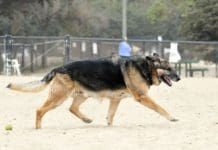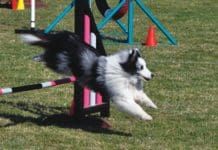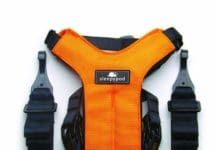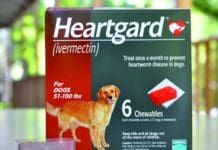10 Ways to Make Your Old Dog Comfortable
Sometimes we don't want to admit our dog is aging. We ignore the graying muzzle and scoff at the idea of a senior dog food." After all
10 Steps to Healthy Skin and a Silky Coat for Your Dog
All dog lovers appreciate seeing a healthy, happy dog, running in the sun with a glistening coat. And it's great to hear, Wow! Your dog's coat is so soft and shiny. How do you do it?" It's wonderful if you are one of the lucky owners whose dog inspires this sort of spontaneous compliment
A Healing Coat
the author's 9-year-old agility dog
Whole Dog Journal’s Car Safety Harness Recommendation
000 words on why reliable and independent crash testing of dog safety restraints is needed. A truly protective safety harness does not allow a dog to "launch" on impact. (For worse shocks
Heart of the Matter
Heartworms might more accurately be called heart-and-lung-worms; these life-threatening parasites are almost as frequently found in the lungs of infected dogs as their hearts. But perhaps the term also references the owners of infected dogs, because when we learn our beloved dog has been diagnosed with these horrid parasites, our hearts are very much affected, if only figuratively. Treatment for heartworm can be risky, expensive, and inconvenient altogether, quite a source of fear and anxiety for dog owners. The more information you have before initiating treatment, though, the better you will be able to support your dog through the process.
Benefits of Turmeric for Dogs
Maybe you've heard about turmeric? It's all the rage, you know. I've recently been exploring the 4,000-year-old history of human use of this plant product and what it can do for you and your dog. Though I've had turmeric sitting in my spice cabinet for longer than I can remember, it wasn't until February of last year that I found out just how beneficial this plant-based substance can be for people and for dogs.
5 Things To Do When Your Puppy Acts Out
You thought you were doing a good thing for your mature dog when you adopted a new puppy. She'll love him!" you assured yourself. "It will keep her young and active." Rather than loving him
Tips for Giving a Dog a Bath at Home
Giving your dog a bath is sort of like mixing a cocktail, or hitting a golf ball: It seems deceptively straightforward, but you need a lot of background knowledge to really master it. From what kind of shampoo to use to how frequently your dog should be sudsing up, there are all kinds of technical questions to consider before grabbing that spray hose and going to town. But there are also deeper issues at play: Nothing quite lays bare the state of your relationship with your dog like trying to negotiate that slippery expanse of porcelain together. Here are some tips for smooth sailing, at bathtime and beyond.
Tips on Adding a Dog to Your Household
We currently have three dogs. We lost our Scottie a few months ago to cancer, and our Australian Shepherd last year to old age and failing health. This is the fewest number of dogs we've had in our family for as far back as I care to remember, and while I grieve Missy and Dubhy's absence every day, a part of me feels some guilty relief that the canine chaos and caretaking load has lightened somewhat. Still, while I know it won't be for a while yet, another part of me contemplates the next potential pup-addition to the Miller pack . . . which leads me to contemplate the complexities and challenges of bringing home a new dog.
What To Do If Your Dog Has Worms
Deworming agents are present in any number of prescription and over-the-counter treatments for dogs and puppies. If your dog shows signs of a gastrointestinal worm infestation, there are all sorts of products available that are made exclusively to rid dogs of various types of worms. But there are also deworming agents included whether they are needed or not in many flea and tick treatments and in most heartworm preventive drugs; in fact, it's sometimes hard to find a minimalist flea treatment or heartworm preventive drug that does not contain dewormers. The question is, is this really necessary? Are intestinal parasites that much of an ongoing threat to most dogs and their owners?
Treatment for Your Dog’s Ear Hematomas
to be sure)
5 Things To Do If Your Dog Snaps at a Guest
If you've never had to deal with that alarming moment when your beloved dog snaps at a guest in your home, you are fortunate. I hope you never do. But just in case, it's good to know that, first, you're not alone lots of dogs have snapped at guests in their homes (or worse!). Second, it's not the end of the world; it doesn't mean you need to euthanize your dog and it doesn't mean your dog will inevitably maul someone. It is, however, an important heads-up for you. How you handle the situation can often determine if your dog's aggression toward visitors escalates or diminishes. So if it happens, here's what you need to do:
















